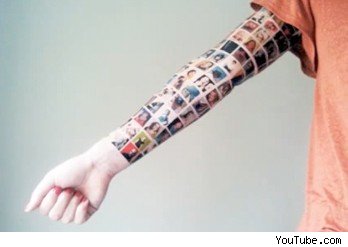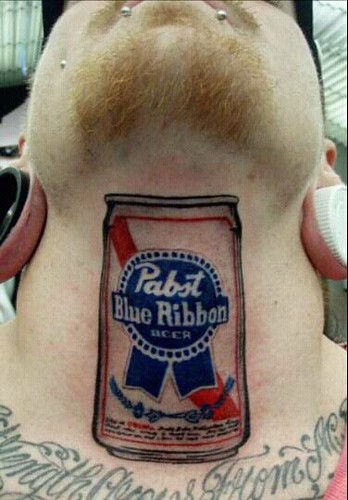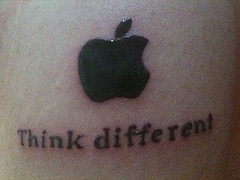
Just as we might have expected, the much-tweeted Facebook sleeve tattoo that I wrote about before has turned out to be a hoax. More specifically, it was a marketing campaign for the company Pretty Social. The company allows you to create custom handbags, stickers, and other products emblazoned with the profile pictures of your (digital) friends.
Nonetheless, the viral video itself made its way around the Internet, serving as but another case of tattoos as advertising. Much has been written on the topic already (Bengsston et. al 2005; McKelvey 1999; Kosut 2005), but I want to theorize further the use of tattooing in marketing as it relates to the phenomena of brand tattoos and lifestyle consumption and the repercussions these trends have for understandings of consumer culture.

Brand tattoos are a distinct type of tattoos that utilize corporate logos and brand labels in their iconography. In my work, I have come across two broad types of brand tattoos. The first are brand tattoos that directly reflect the logos they are supposed to represent, often invoking the images as a marker of one’s taste or lifestyle. These tattoos play directly into the phenomenon of lifestyle consumption (Featherstone 1990) in that the bearer’s seek to proclaim their investment in the brand (or in this case, their commitment to a particular social networking community) as a source of distinction (Bourdieu 1984). Examples include Pabst Blue Ribbon tattoos, Nike swoosh tattoos, and even the iconic Black Flag logo.

The second type of brand tattoos are those that deliberately seek to modify the original brand label in some way, in order to make a statement that is playful, biting, or ironic. While it is hard to draw the line between the two types of brand tattoos (because it is difficult for us to measure intentionality), the latter often incorporate the brand logo in juxtaposition with other signs. For example, the use of the Apple logo emblazoned with the text “Think Different” underneath.

Both types of brand tattoos play into what some have called “expressive individualism” (Sweetman 1999). Rather than serving as traditional markers of working class masculinity or alignment with a subcultural group, brand tattoos like these serve as expressions of one’s tastes (an indirect sign reflecting commitment to a lifestyle or consumer market). As a relatively permanent commodity that resists the “throwaway culture” of consumer capitalism (Kosut 2005), the brand tattoo becomes a corporeal expression of one’s commitment to a given brand or lifestyle tribe (Maffesoli 1996), and hence, a source of distinction for the bearer. In this sense, it serves as a sign of “anti-fashion,” or one’s lifelong commitment to a particular brand or community that transcends the ebbs and flows of the marketplace. The problem is that such tattoos are essentially permanent, but the cycles of fashion are continually changing. But I digress…

The Facebook profile picture sleeve, as a exemplary case of viral marketing, utilizes a subcultural marker of identity in an attempt to create a buzz about the company’s products. This trend is not new, as Kosut (2005) has shown. Companies have been using the tattooed body as a billboard for quite some time, taking the concept of “billboard advertising” to a whole new level. Companies who want to appear cutting edge, youthful, or innovative often use tattoos, tattoo iconography, and tattooed bodies in their advertisements. In an attempt to attract the consumer dollar, such marketing techniques serve to illustrate the concept of “brand management” (Arvidsson 2005). Companies are even attempting to “buy” ad space on the bodies or professional athletes in order to capitalize on the visibility of such sports athletes as popular celebrities.
While some lament these trends as invasive attempts to commodify the body, I see brand tattoos indicative of the changing semiotics surrounding the tattoo. No longer a practice reserved for carnival workers, sailors, and exotic dancers, tattoos have now successfully become a part of the “supermarket of style” (Polhemus 1997) that many individuals and corporations alike both draw from to collectively construct their identities.

Comments 4
Ellie. — August 9, 2011
The apple/think different tattoo doesn't seem too ironic, seeing as "think different" WAS an apple motto back in the 90's. Or an I missing something here?
Dave Paul Strohecker — August 10, 2011
Oh you are right about that Ellie. I was unaware of that. Thanks for bringing it to my attention.
Dave Paul Strohecker — August 10, 2011
For some more examples of "ironic" or "playful" brand tattoos, check out this forum (NSFW).
http://www.chilledtimes.com/showthread.php?566-Rubbish-Tattoos
Corporate tattoos « Challenge accepted — May 29, 2012
[...] http://thesocietypages.org/cyborgology/2011/08/05/sns-tattoos-redux-branding-and-lifestyle-consumpti... [...]